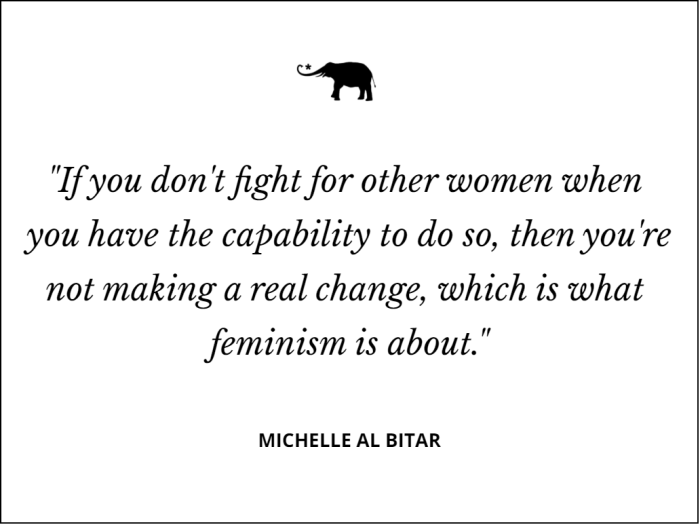Today I met the amazing Mazoun Almellehan, a refugee devoting her life to keeping girls in school. #Syria #CNNJordan pic.twitter.com/UwEuhlP4S7
— Nick Thompson (@nickthompson) June 23, 2015
We need to be responsible for calling ourselves feminists.
I first started really understanding the true meaning of feminism when I was at university. Being an English Literature major, I had to read all literary theory, and this isn’t limited to analyzing feminist texts only. We had to really comprehend the history of each theory before analyzing any text.
Simply knowing that women fought for their right to vote isn’t enough to consider ourselves knowledgeable on feminism. This is only reciting historical facts.
I had to go through the waves of feminism in details, understand its several facets, and eventually keep in mind that feminism could be divided into several subcategories. It isn’t the same for all women, although it falls under the same title, “equal rights for all.”
For instance, there is the women’s suffrage movement, which involved ladies who fought for their right to vote in the late-19th and early-20th centuries, and there is Black feminism that has a multidimensional approach to liberation.
What do these two have in common? They both had to fight for their rights.
How are they different? Suffragettes had to fight for their rights as women, whereas Black feminists had to fight for their right as women of color.
Nowadays, it is easy to get lost in the widespread “man-hating feminists'” rabbit hole. I, myself, was so sick at some point with reading articles that were all about spreading hate against men (most importantly, men in general, not abusers, not misogynists, just men).
This is not what feminism is about, as varied as it is and as many subcategories as it has. It is and it’s always been (as history tells us) about fighting for the women who don’t have a voice, about fighting for rights they don’t possess, and about making a real change.
If I’m rambling for hours about why I’m a feminist because I open my own doors, while I’m disregarding other women’s suffering, then I’m not really a feminist.
If you don’t fight for other women when you have the capability to do so, then you’re not making a real change, which is what feminism is about.
As a Lebanese woman (in other words, a woman from the Middle East), I feel it is necessary to raise awareness about certain realities that not many are aware of.
Here are 10 facts every feminist (and non-feminist) should know about women in the Middle East:
According to UN Women, here are some shocking facts you may not have known before:
1. Thirty-seven percent of Arab women suffered from violence throughout their lives (and the number might even be higher).
2. Around four in every 10 women who are victims of homicide worldwide are killed by intimate partners.
3. Female Genital Mutilation is still a thing in the Middle East. Ninety-two percent of women and girls in Egypt between 15 and 49 years of age have gone through this. Thankfully, the number has decreased from 74 percent to 61 percent for girls between 15 and 17 years since 2008.
4. Underage marriage is also a thing. Around 14 percent of Arab girls are getting married under the age of 18…against their will.
5. Often, rapists are forgiven by their society and the law if they marry their victim. Not until 2017 did Lebanon make a historic amendment to its penal code and abolished Article 522 that allows rapists to marry their victim. Not until 2014 was Article 475 in Morocco repealed, which clearly gives the right to the rapist to marry the victim.
And much more atrocious things are still happening in the Middle East (and probably elsewhere), but I won’t only highlight the negative things in this article. I want to show the world what Middle Eastern women are also capable of.
6. In Syria, Mazoun Almellehan fought for girls’ education in Jordan’s Azraq Refugee Camp. She led a campaign by herself to persuade parents to keep their girls in schools instead of making them marry at a young age.
7. Nadine Labaki, a Lebanese actress, writer, and director created the film “Capharnaüm” and received a 15-minute standing ovation at its premiere at Cannes Film Festival. She is the first Arab female to take the Jury Prize home.
Meet NADINE LABAKI, President of Un Certain Regard Jury ?
Discover the full interview on our website: https://t.co/DVDBm0hsHv#Cannes2019 #NadineLabaki pic.twitter.com/2VHS6A2ulv— Festival de Cannes (@Festival_Cannes) May 17, 2019
8. In Saudi Arabia, Manal al Sharif openly defied the ban on driving for women by posting a video of herself online while she was driving with the hashtag #Women2Drive in 2021. Following her rebellious act, she was detained for nine days in jail. However, this did not stop her from still fighting for the women of her country. Thankfully, in 2018, after a long struggle against this law, Saudi women could officially get behind the wheel without being tossed in jail.
9. When it comes to sports, we can’t forget about squash player Nour El Sherbini. She’s from Egypt and became the first woman to win the Tournament of Champions three times (while still in her 20s).
10. The first female fighter pilot from Bahrain’s royal family, Sheikha Aisha bint Rashid Al Khalifa flew solo in a BAE Hawk warplane in 2018, and she holds the rank of pilot officer in Royal Bahraini Air force.
There are so many more Middle Eastern women who made a change in the world, and I’m hoping you’re going to be curious enough to look them up. It’s just one click away.
As a first step, let’s start educating ourselves about women in the Middle East, their sufferings and their achievements, and get out of our own bubble of limited feminism.
~
~








Read 8 comments and reply